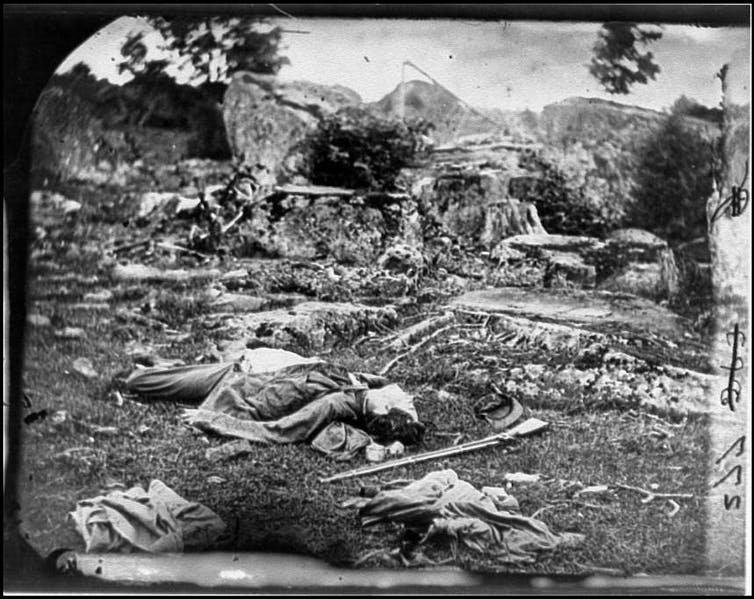During the 2016 presidential campaign, then-candidate Donald Trump refused to promise to accept the results of the election. Likewise, in 2020, his continued assault on the reliability and legitimacy of mail-in voting has laid the groundwork for challenging a loss on the basis of voter fraud. He has also refused to promise to observe the 2020 results.

This has led some to worry that a contested election would severely undermine faith in American democracy.
READ MORE: After the conventions, here’s what comes next as the U.S. election approaches
Yet the United States has a long history of such contested elections. With one exception, they have not badly damaged the American political system.
That contested 1860 election — which sparked the Civil War — happened in a unique context. As a political scientist who studies elections, I believe that, should President Trump — or less likely, Joe Biden — contest the results of the November election, American democracy will survive.

Legitimacy and peaceful transitions
Most contested presidential elections have not posed threats to the legitimacy of government.
Legitimacy, or the collective acknowledgment that government has a right to rule, is essential to a democracy. In a legitimate system, unpopular policies are largely accepted because citizens believe that government has the right to make them. For example, a citizen may despise taxes but still admit that they are lawful. Illegitimate systems, which are not supported by citizens, can collapse or descend into revolution.
In democracies, elections generate legitimacy because citizens contribute to the selection of leadership.
In the past, contested elections have not badly damaged the fabric of democracy because the rules for handling such disputes exist and have been followed. While politicians and citizens alike have howled about the unfairness of loss, they accepted these losses.

Contested elections and continuity

Get daily National news
In 1800, both Thomas Jefferson and Aaron Burr received the same number of votes in the Electoral College. Because no candidate won a clear majority of Electoral votes, the House of Representatives followed the Constitution and convened a special session to resolve the impasse by a vote. It took 36 ballots to give Jefferson the victory, which was widely accepted.
In 1824, Andrew Jackson won a plurality of the popular and electoral vote against John Quincy Adams and two other candidates, but failed to win the necessary majority in the Electoral College. The House, again following the procedure set in the Constitution, selected Adams as the winner over Jackson.
The 1876 election between Rutherford B. Hayes and Samuel Tilden was contested because several Southern states failed to clearly certify a winner. This was resolved through inter-party negotiation conducted by an Electoral Commission established by Congress. While Hayes would become president, concessions were given to the South that effectively ended Reconstruction.
The contest between Democrat John F. Kennedy and Republican Richard Nixon in 1960 was rife with allegations of voter fraud, and Nixon supporters pressed for aggressive recounts in many states. In the end, Nixon begrudgingly accepted the decision rather than drag the country through civil discord during the intense U.S.-Soviet tensions of the Cold War.
Finally, in 2000, GOP candidate George W. Bush and Democratic candidate Al Gore tangled over disputed ballots in Florida. The Supreme Court terminated a recount effort and Gore publicly conceded, recognizing the legitimacy of Bush’s victory by saying, “While I strongly disagree with the Court’s decision, I accept it.”
In each case, the losing side was unhappy with the result of the election. But in each case, the loser accepted the legally derived result, and the American democratic political system persisted.
READ MORE: Trump tells voters to vote twice, once by mail and once in person, in November election
The system collapses
The election of 1860 was a different story.
After Abraham Lincoln defeated three other candidates, Southern states simply refused to accept the results. They viewed the selection of a president who would not protect slavery as illegitimate and ignored the election’s results.
It was only through the profoundly bloody Civil War that the United States remained intact. The dispute over the legitimacy of this election, based in fundamental differences between the North and South, cost 600,000 American lives.

Alexander Gardner, photographer/Library of Congress Prints and Photographs Division
What is the difference between the political collapse of 1860 and the continuity of other contested elections? In all cases, citizens were politically divided and elections were hotly contested.
What makes 1860 stand out so clearly is that the country was divided over the moral question of slavery, and this division followed geographic lines that enabled a revolution to form. Further, the Confederacy was reasonably unified across class lines.
While the America of today is certainly divided, the distribution of political beliefs is far more dispersed and complex than the ideological cohesion of the Confederacy.
Rule of law
History suggests, then, that even if Trump or Biden contest the election, the results would not be catastrophic.
The Constitution is clear on what would happen: First, the president cannot simply declare an election invalid. Second, voting irregularities could be investigated by the states, who are responsible for managing the integrity of their electoral processes. This seems unlikely to change any reported results, as voter fraud is extraordinarily rare.
The next step could be an appeal to the Supreme Court or suits against the states. To overturn any state’s initial selection, evidence of a miscount or voter fraud would have to be strongly established.
If these attempts to contest the election fail, on Inauguration Day, the elected president would lawfully assume the office. Any remaining ongoing contestation would be moot after this point, as the president would have full legal authority to exercise the powers of his office, and could not be removed short of impeachment.
While the result of the 2020 election is sure to make many citizens unhappy, I believe rule of law will endure. The powerful historical, social, and geographic forces that produced the total failure of 1860 simply are not present.
Alexander Cohen, Assistant Professor of Political Science, Clarkson University
This article is republished from The Conversation under a Creative Commons licence. Read the original article.







Comments
Want to discuss? Please read our Commenting Policy first.